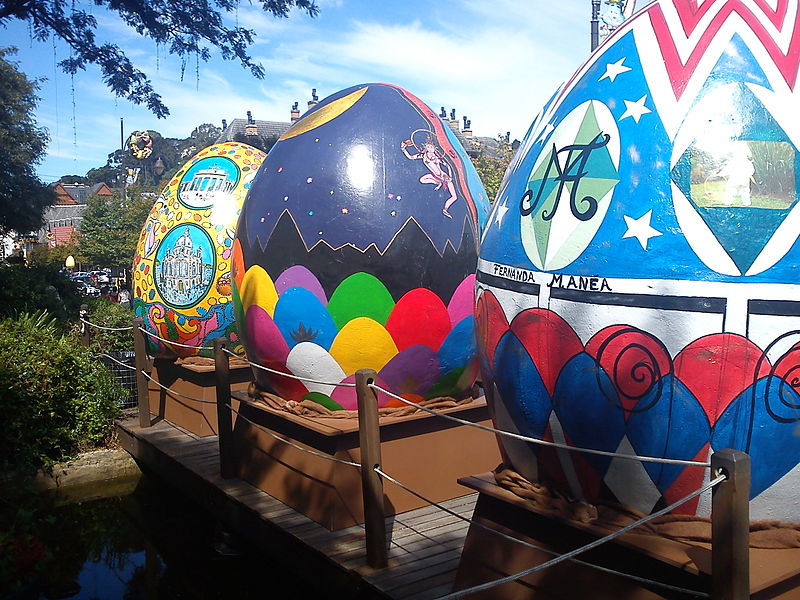Brazil has one of the largest Catholic populations in the world. Holy Week—Semana Santa in Portuguese—is observed by many throughout the country with processions and rituals similar to those of other Catholic countries, yet made unique by the Brazilian cultural context and history.
Some well known Holy Week events in Brazil include:
- Procissão do Fogaréu in Goiás Velho, GO, a torchlight procession where hooded men symbolize Roman soldiers arresting Jesus.
- Passion Plays in Nova Jerusalém and Recife
Easter Travel in Brazil
In a secular approach to Holy Week, some Brazilians will rush to the beach and other popular vacation areas in Brazil to take advantage of the holiday and school breaks, which usually extend to the whole week (in March or April).
Add to that the great volume of people traveling to destinations famous for traditional Catholic rituals and folks just looking to be with family for the holiday, and you’re in for busy roads and airports as well as fully booked hotels and crowds. Traditionally, hotels book Semana Santa in packages running from Holy Thursday to Easter Sunday. Unique celebrations of the season start with Carnival, marking the beginning of Lent and then continue through Easter Sunday.
Some of the best-loved destinations in Brazil for those who seek to experience traditional Catholic Holy Week are historic cities where colorful processions take place on cobblestone streets and Mass is held in historic churches.
Music for the Season
Paixão e Fé (Passion and Faith), a song by Tavinho Moura and Fernando Brant recorded by Milton Nascimento, poetically expresses the season’s spiritual tone and describes the passage of a procession. One way to anticipate what Holy Week will be like is to watch a Paixão e Fé video on YouTube such as one posted with photos of special places in Brazil.
Important Catholic Holy Week Events
The events that take place during Holy Week follow closely the timeline of Christ’s arrest, crucifixion, and ultimate resurrection. Each day has a special meaning and is celebrated with a Mass and age-old traditions.
- Procession and Mass on Palm Sunday (Domingo de Ramos): On the Sunday before Easter, Christ’s arrival in Jerusalem, when palms were spread before Him as He rode into town on a donkey is commemorated. Traditionally, people carry palms that are then blessed at the church and taken home.
- Lava-pés (Washing of the Feet): Just as Christ washed His apostles’ feet, twelve people from various social classes have their feet washed by priests during a special mass on Holy Thursday.
- Procissão do Encontro: On Good Friday women carrying an image of Nossa Senhora das Dores (Virgin of Sorrows) meets a procession of men carrying Nosso Senhor dos Passos, an image of Christ burdened by His cross.
- The descent of the Cross: On Good Friday, a procession and Mass is held.
- Canto da Verônica (Veronica’s Chant): A strong tradition in Brazil, it is symbolic of the apocryphal passage describing the scene as Veronica wiped Christ’s face on the Via Dolorosa. The chant is often sung during Procissão do Encontro.
- Paschal Vigil (Vigília Pascal): This is a service held between sunset on Holy Saturday and sunrise on Easter Sunday with the lighting of a new fire which will, in turn, light the Easter Candle, a symbol of Jesus Christ’s light unto the world.
- Festive Easter Sunday Procession and Mass
Travelers who don’t have a sacred connection to Holy Week events can show respect in simple ways such as not wearing shorts or revealing clothing to rituals, or refraining from taking pictures inside churches.
Whether you’re a devout Catholic or someone who simply seeks to experience local life in all of its nuances, Holy Week celebrations are one of your keys to a deeper knowledge of Brazil and its culture.
Carpets on the Streets
One of the most beautiful traditions in Holy Week is the decoration of streets for the Sunday procession. Many cities do it for Corpus Christi, but in Ouro Preto, for example, people create colorful carpets with wood shavings, flour, coffee, flowers, and other elements the night before Easter Sunday for the procession to walk on.
Easter Eggs
In Brazil, an Easter egg is usually a chocolate egg. Supermarkets, which decorate a special aisle with a tunnel made of brightly wrapped Easter eggs, boutique chocolatiers; as well as bakeries and pâtisseries, all get busy and stock up as the country is swept by chocolate cravings in the weeks before Easter. Some of the best-known companies selling fine Easter eggs in Brazil are Kopenhagen and Cacau Show.
Source: tripsavy.com




